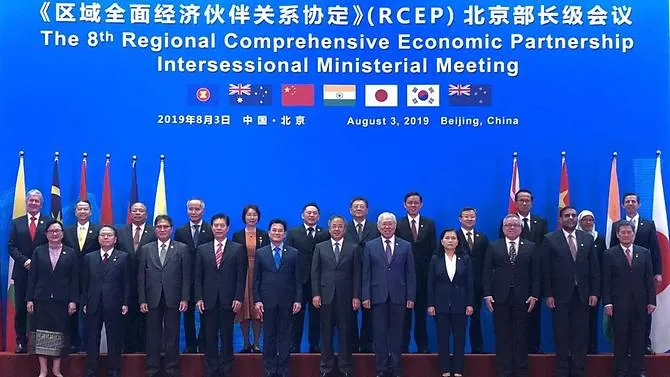Concluding RCEP trade pact this year the ‘highest priority’
04 August, 2019

Ministers from the 16 countries involved in the Regional Comprehensive Economic Partnership (RCEP) said it is in the region’s "collective interest" and the "highest priority" to conclude the trade pact this year.
They also called it the “most important trade agenda in the region”, in a joint statement issued at the end of a meeting in Beijing on Saturday (Aug 3).
The call comes as ministers said the growth outlook remains overcast by rising uncertainties, with economic growth in the RCEP region easing to 5.6 per cent last year, from 5.8 per cent in 2017.
The trade deal involves the 10 ASEAN countries and its six trading partners – China, India, Japan, South Korea, Australia and New Zealand.
If agreed to, RCEP will form the largest trading bloc in the world – accounting for a third of global GDP.
Speaking at the opening ceremony of the meeting, Chinese Vice Premier Hu Chunhua said that RCEP negotiations have reached a final and key stage.
This follows the 27th round of working level negotiations last week in China’s Zhengzhou city, which lasted for 10 days.
Mr Hu said 80 per cent of the agreement is complete, although he acknowledged serious and sensitive challenges still exist.
“The closer we get to success, the more challenges we will face. It will be a test of will and patience,” said Mr Hu.
“In the face of difficulties, we should stay committed to the vision because one step back will undo the progress made.”
In the joint statement, Ministers welcomed the conclusion of the annexes on telecommunication, financial and professional services.
Over two-thirds of market access negotiations have reached “mutually satisfactory outcomes” the statement added, with work on the remaining areas being intensified through constructive engagements.
In his speech, Vice Premier Hu also called on countries to exercise greater flexibility - ahead of the proposed year-end deadline.
While he did not name specific countries, it has been widely reported that India has shown reluctance to open its markets and raised concerns about lifting tariffs.
India’s commerce minister did not attend the meeting citing parliament engagements.
“To build a regional integrated market is a shared objective. Every participating country in opening its market, will also have the opportunity to get into other markets,” said Mr Hu.
“I hope all parties will take a long term view and find ways to push forward negotiations in an innovative way while maintaining balance.”
In a Facebook post, Singapore’s Trade and Industry Minister Chan Chun Sing said countries reached an important milestone at the meeting.
“We achieved good progress in RCEP negotiations and found ways forward on some outstanding issues, bringing us closer to the finishing line,” wrote Mr Chan.
“The months ahead will be critical for the RCEP negotiations, and we agreed that it is important to exercise maximum flexibility to resolve the remaining issues.”
RCEP talks were officially launched in 2012 but have faced several delays.
China has been increasingly keen to conclude the trade pact, amid a backdrop of a bruising and prolonged trade war with the United States.
This also comes amid tensions between Japan and South Korea, with both revoking each other’s favoured export partner status.
